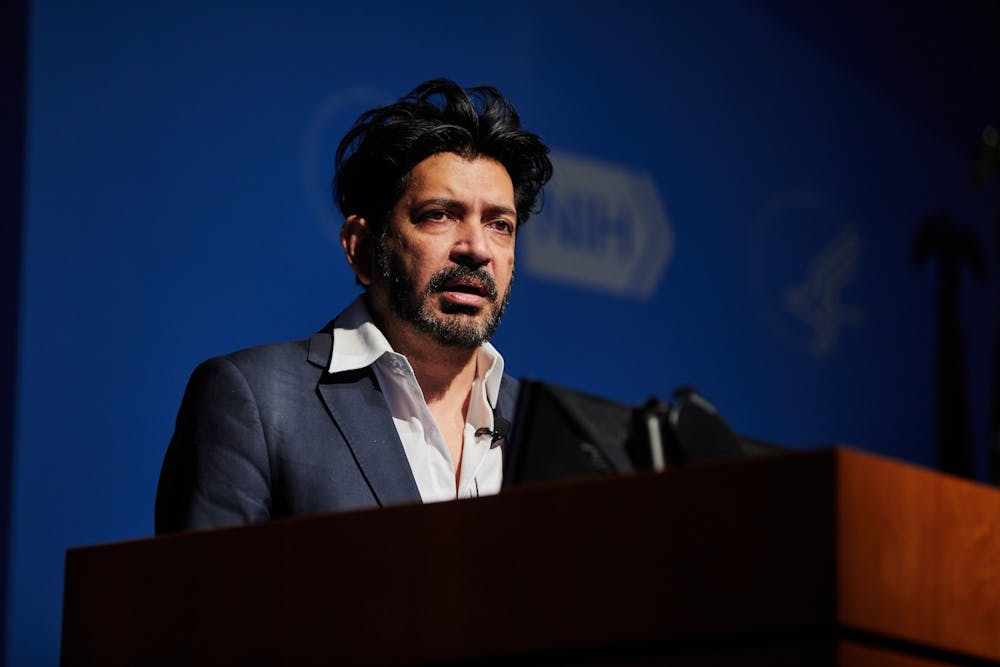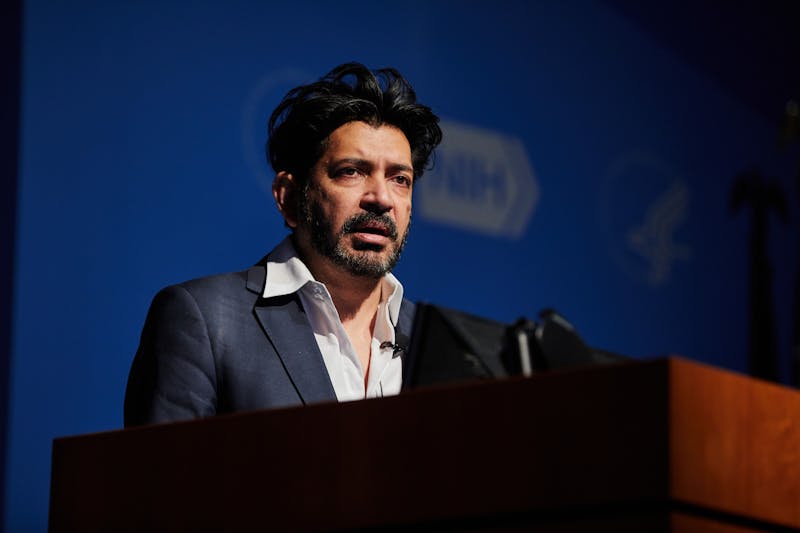
Meet Siddhartha Mukherjee, the Pulitzer Prize-winning author and cancer physician who will deliver Penn’s 2024 Commencement speech on May 20.
1. He is a 1993 Rhodes Scholar
As a senior at Stanford University majoring in biology, Mukherjee was named a 1993 Rhodes Scholar, receiving one of the four Rhodes scholarships awarded that year in his home country of India. The Rhodes Scholarship is a prestigious international postgraduate award that allows students to study at the University of Oxford.
According to a 1992 news release from Stanford University, Mukherjee was a student researcher in the biological sciences, studying a gene that causes cancers in the immune system with Nobel laureate Paul Berg. Through the scholarship, Mukherjee went on to study immunology at Oxford’s Magdalen College, receiving a Ph.D. in 1997 for his thesis titled “The processing and presentation of viral antigens.”
2. His writing combines memoir with history and science
Mukherjee’s first book, “The Emperor of All Maladies,” originated from a journal he began keeping during his oncology fellowship at the Dana-Farber Cancer Institute. The “biography” of cancer — which won him a Pulitzer Prize in 2011 and is included among Time magazine’s 100 best nonfiction books of the century — combines the origin and history of the disease with Mukherjee’s own experiences of life and death.
The New York Times described his work as weaving “history and biology into a story about who we are.”
Mukherjee’s 2016 book, “The Gene,” discusses genetic research and his family’s history of mental illness.
“Madness has been among the Mukherjees for generations,” he wrote in "The Gene."
3. He writes in bed
Mukherjee’s most recent book, “The Song of the Cell,” published in 2022, was likely written from his bed. Mukherjee told The Guardian in 2022 that he “famously” writes in bed, a habit for which people frequently make fun of him.
“But I love writing in a small place. I don’t have a writing studio or anything like that. I like to snuggle up with my computer,” he said.
When Mukherjee isn’t writing from bed, he is writing from a red suede couch in his office at the Columbia University Medical Center, where he is a professor of medicine and an oncologist. In his 2018 article in The Guardian, Mukherjee shared that he gets his writing done between patient appointments and conducting research at his blood cancer lab.
4. He co-founded four biotechnology and healthcare companies
Mukherjee is the board director and co-founder of Immuneel Therapeutics, a startup that aims to increase access to immunotherapies for cancer patients in India. Based in Bengaluru, the startup treats leukemia patients with chimeric antigen receptor T-cell therapy. Penn researcher Carl June serves on Immuneel’s scientific advisory board.
Mukherjee also founded CAR-T biotech Vor Biopharma, Myeloid Therapeutics, and Faeth Therapeutics, which all have a mission of developing cancer treatments and improving patient outcomes through different technologies.
5. He performs in a jazz fusion band
While Mukherjee was completing medical school at Harvard University, he also trained as an Indian classical music vocalist.
“I think that there’s a very, very deep relationship between music and science,” Mukherjee told The Times of India.
Mukherjee now performs on stage as part of a jazz fusion band.
“It is not as if the fusion of Indian classical music and jazz has a great audience like Harry Styles,” Mukherjee said to The Week. “They are well attended, but they tend to be in a niche. I like it that way.”
The Daily Pennsylvanian is an independent, student-run newspaper. Please consider making a donation to support the coverage that shapes the University. Your generosity ensures a future of strong journalism at Penn.
Donate











